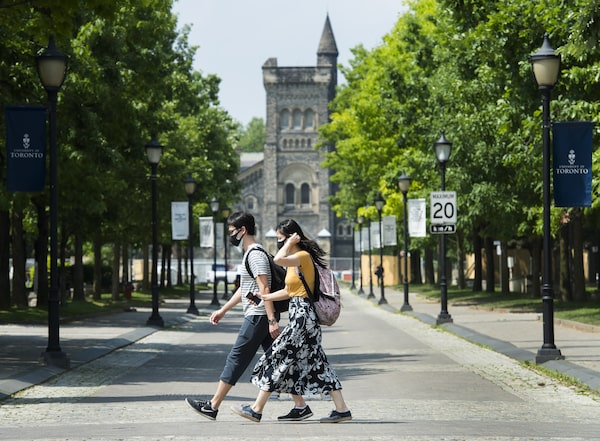
Students walk past the University of Toronto campus on June 10, 2020.Nathan Denette/The Canadian Press
Paul Axelrod, a historian of higher education, is a retired professor and former dean of the faculty of education at York University.
The state of free speech on university campuses, especially in the United States, is rousing angst triggered most recently by conflict in the Middle East. But incidents of silencing and even intimidation of individuals whose controversial statements offended listeners did not begin with the Israel-Hamas war in October. Where ideas clash, as they should in universities, intolerance and dogmatism are often fellow travellers.
Free speech for students and academic freedom for faculty are not and have never been absolute, nor should they be. What restraints on campus expression are legitimate and what restrictions are unjustifiable? Can universities find a principled and reasonable process for managing debate in these troubled times? They must.
In the first half of the 20th century, student newspapers could be censored for being risqué and too adversarial in a paternalistic and often pious environment. Faculty, too, who openly criticized their presidents or engaged in radical politics were also vulnerable to censure or sanction.
In the wake of campus protests in the 1960s, students gained much greater autonomy as administrations largely abandoned anachronistic regulations on student behaviour and expression. Additionally, professors, through governance reform and collective agreements, secured tenure arrangements that protected them from chastisement or dismissal for speaking or writing contentiously.
Constraints on speech did not disappear, however, and in some ways were refashioned in the decades that followed. As gender and racial barriers to access and opportunity were challenged, and as society paid more heed to the issues of discrimination and human rights, many North American universities developed new protocols designed to ensure civility and respectful dialogue on campus. Faculty who humiliated or harassed students and colleagues with sexist language could be expected to be called to account. Racist comments, by students or others, would (and do) violate university codes of conduct, and everyone (in Canada) is subject to the stipulations of the Criminal Code, which bans hate speech.
“Trigger warnings” given prior to the discussion of highly sensitive topics such as rape, child abuse or suicide are commonly employed, as lecturers and seminar leaders become more sensitive to the potentially adverse effects of language. Far less defensible are blanket demands, usually by militant students, that any words that they consider “offensive” should be proscribed.
Right-wing ideologues who seek to oust postmodernists, critical race theorists and Marxist scholars from academia recall McCarthyites of the 1950s who succeeded (mostly in the United States) in driving many leftists from universities and governments. Left-wing ideologues who shout down conservative speakers and prevent the regular functions of campus life exercise their own version of political authoritarianism.
Perhaps the most insidious sort of speech restraint is the most difficult to document: self-censorship. If faculty and students are chronically afraid to speak their minds on controversial subjects for fear of denunciation (versus thoughtful criticism), bullying or worse, then the university has lost its moral compass. If normal campus “discourse” replicates the venomous interactions of much social media, then liberal education, which depends on civility, informed opinion and open-mindedness, is at great risk.
The daily life of universities is not as polarized and contested as media reports imply. Regular academic work goes on for most faculty and students. But there is no denying the eruption of disturbing episodes in recent times, including the unjustified stifling of speech by doctrinaire university members who fail to appreciate that their own autonomy depends on defending that of others.
Will the conflict over the war in the Middle East push higher education into completely illiberal territory? If that is to be avoided, then the following principles should be fully embedded and effectively applied: Vigorous expression of controversial points of view is legitimate and encouraged. Classes should be conducted civilly, without rancour or hostility. Harassment and intimidation of fellow university members are unacceptable, as is antisemitic, Islamophobic or other racist speech. Peaceful political demonstrations are permitted on campus. The disruption of classes and other core university activities is not. Violence and threats of violence should be reported to the police and handled swiftly.
In short, key Enlightenment values that have served our universities well, if imperfectly – liberty, tolerance, skepticism, rationality and the pursuit of knowledge – deserve to be reaffirmed in an increasingly confrontational age. The alternatives, on and off campus, are alarming.